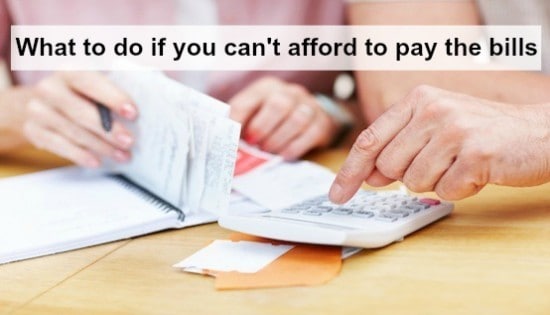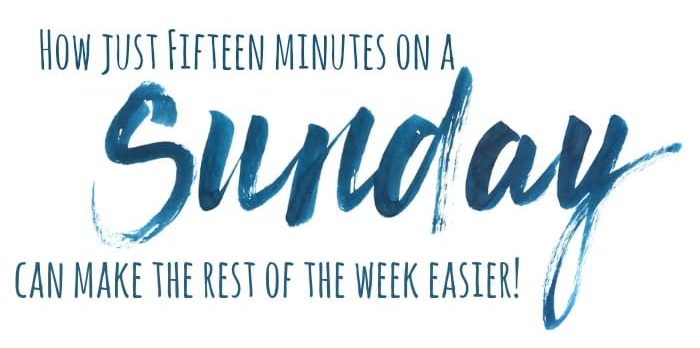
I’ve written before calculating your monthly budget using my free printable budget planner but today I wanted to try and help with some advice about what you can do if you don’t have enough money coming in each month to cover what you’re paying out and you can’t afford to pay your bills.
I’m by no means an expert on this subject but I do know that if you realise that you don’t have enough money to pay bills then you need to take action – sooner rather than later. I know that this might seem like a bit of an obvious thing to say but from experience (work not personal) I know that some people pretend that everything is OK and carry on as they were hoping that things will improve possibly, often using a credit card for general living expenses.
In fact, someone who’s trying to pretend that everything’s OK when it’s really not is a bit like a child sticking their fingers in their ears and humming when you try to tell them to tidy their room up. They’re going to have to do it eventually so why waste time and energy pretending otherwise.
You can only sustain the pretence that everything’s OK for so long and ultimately, unless you win the lottery of course, things will just snowball and get worse each month until it can feel almost impossible to find a solution.
So, here’s my top tops for what you should do if you are struggling….
1. CHANGE YOUR SPENDING HABITS
Can you bridge the gap by spending less each month? If you can then start right now by making sure that you don’t buy anything unless you really need it and only buy things you can pay for there and then – don’t buy things on credit as they’ll end up costing you so much more in the long run. Keep a spending diary for a month so you can see exactly where you’re spending. Do this even if it’s not going to be the answer to all of your problems – every amount you can save is going to help! Look out for tomorrow’s post for some more help with spending less.
2. CUT BACK
We all have different ideas about what we would give up to get out of debt and I’ve written all about where you can cut back here as a starting point for you but to be honest, if you’re at the point where you’re struggling to pay bills then you really don’t have the luxury of deciding what you’ll keep as a treat and what you’re willing to give up. You need to be looking at your luxuries like satellite TV, cigarettes, mobile phone contracts, gym memberships (even if you do go) – basically everything that’s non-essential.
If you can’t get rid of things completely you could look at things like your TV package and ask yourself if you can save money by cutting down on the number of channels you pay for. Can you negotiate a better contract for your phone, or if you’re out of contact, is it worth swapping to Pay As You Go?
Have a look at my 50 ways to save money post and see how many changes you can make to save some money. The quickest changes to implement are generally getting into the meal planning habit and changing the way you shop to save money on your weekly shopping but there are so many other ways to save money on there that you probably haven’t even thought about.
3. MAKE SURE YOU’RE CLAIMING WHAT YOU’RE ENTITLED TO
You should also make sure you’re claiming everything you’re entitled to using a site like this one – don’t be ashamed or embarrassed about claiming benefits. If you need them then you need them and that’s what they’re there for.

4. SORT OUT YOUR DEBTS
This is the biggie. People get so worried about what companies will do to them if they can’t afford to pay their bills that they put off calling the companies. This makes things worse as they’ll start contacting you then – letters, telephone calls and even the possibility of debt collection agencies getting involved.
Most companies though will help you if you’re honest with them. Tell them how much you can afford to pay and stick to it – it’s cheaper and easier for them to allow you to make reduced payments for a while. If they do agree a reduced payment then the chances are they’ll stop or reduce the interest meaning that you will be paying more off your debt each month.
Just remember that late payments will affect your credit file and they’ll stay on there for up to six years. Even a reduced repayment plan will show on your credit file but at least that shows you’ve come to an agreement with the company and are sticking to it.
If you prefer to write to companies rather than speak to them on the telephone then I’d recommend using something like this letter, which you’re more than welcome to copy and paste if it helps….
Dear Sirs.
Re: Account Number – xxxx
I regret that since entering into the above agreement with you, my circumstances have changed and I am now experiencing financial difficulties. Unfortunately, I am unable to meet the agreed monthly payment because (explain difficulty e.g. lost job).
I enclose a copy of my Financial Statement. As you can see, after my essential outgoings are deducted from my monthly income, I have …. (Choose one of the following options) a) no funds left to pay my creditors. Under the circumstances, would you please accept a token offer of payment of £1.00 per month until my situation has changed? or b) only (Insert total amount available to pay creditors) to pay my creditors of which the pro rata offer to you will be £(Insert monthly payment amount for this creditor).
I would also be grateful if you could freeze the interest charges on my account during this difficult time so that I can use the money that I have available to reduce my outstanding balance. I hope that you will accept my offer and I would like to reassure you that I am making every effort to increase my income and I will contact you again as soon as my circumstances improve.
I would like to thank you for your time in considering my offer of repayment and I look forward to hearing from you shortly,
Yours faithfully
If your offer is declined or you can’t set up an agreement on your own for any reason there are places like the Citizens Advice Bureau and StepChange (the new name for the Consumer Credit Counselling Service) who can provide you with free advice on what you can do to reduce your monthly payments to your creditors.
I could give you lots of information about the options available to you but I think I’d be best leaving that to the experts, like the Citizen Advice Bureau and StepChange as they are much more knowledgeable than me. It’s also worth pointing out that both of these organisations are none profit making so won’t charge you for their advice – a lot of the debt management companies you see advertising on the TV charge you for their services and they do exactly the same thing!
The StepChange website in particular has a lot of great advice so it’s well worth having a look around there to see what options are available to you.
Has anyone else got any advice for what to do when you can’t afford to pay?
Don’t miss out on future posts like this – receive updates directly to your inbox by email by adding your email address to the box on the top right of this page and hitting subscribe. You can also follow me on BlogLovin or Networked Blogs and I’d love to see you over on my Facebook page and on Instagram.

Image credit – Shutterstock, focal point







 Logging you in...
Logging you in... Loading IntenseDebate Comments...
Loading IntenseDebate Comments...
